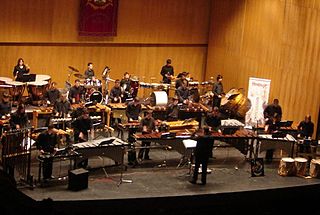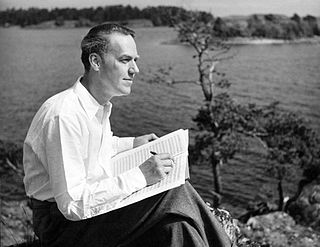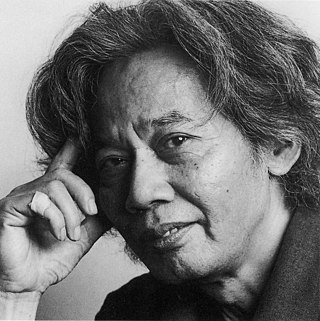Related Research Articles

Franz Adolf Berwald was a Swedish Romantic composer and violinist. He made his living as an orthopedist and later as the manager of a saw mill and glass factory, and became more appreciated as a composer after his death than he had been in his lifetime.

John Stanley Body was a New Zealand composer, ethnomusicologist, photographer, teacher, and arts producer. As a composer, his work comprised concert music, music theatre, electronic music, music for film and dance, and audio-visual gallery installations. A deep and long-standing interest in the music of non-Western cultures – particularly South-East Asian – influenced much of his composing work, particularly his technique of transcribing field recordings. As an organiser of musical events and projects, Body had a significant impact on the promotion of Asian music in New Zealand, as well as the promotion of New Zealand music within the country and abroad.

Gustaf Allan Pettersson was a Swedish composer and violist. He is considered one of the 20th century's most important Swedish composers and was described as one of the last great symphonists, often compared to Gustav Mahler. His music can hardly be confused with other 20th-century works. In the final decade of his life, his symphonies developed an international following, particularly in Germany and Sweden. Of these, his best known work is Symphony No. 7. His music later found success in the United States. The conductors Antal Doráti and Sergiu Comissiona premiered and recorded several of his symphonies. Pettersson's song cycle Barefoot Songs influenced many of his compositions. Doráti arranged eight of the Barefoot Songs. Birgit Cullberg produced three ballets based on Pettersson's music.

A percussion ensemble is a musical ensemble consisting of only percussion instruments. Although the term can be used to describe any such group, it commonly refers to groups of classically trained percussionists performing primarily classical music. In America, percussion ensembles are most commonly found at conservatories, though some professional groups, such as Nexus and So Percussion exist. Drumlines and groups who regularly meet for drum circles are two other forms of the percussion ensemble.
Sven-David Sandström was a Swedish classical composer of operas, oratorios, ballets, and choral works, as well as orchestral works.

Sigurd Christian Jag Erland Vogt von Koch was a Swedish composer. He wrote symphonies, ballets, an opera, and other compositions, including music for film.
Víctor Varela is a Venezuelan-Swedish composer based in Gothenburg. His compositions include works for orchestra, vocal and instrumental chamber music, with electronics and computer devices.
Åke Parmerud is a Swedish composer, musician, and multimedia artist noted for his acoustic and electronic works, which have been performed mostly in Europe, Mexico, and Canada. He is also noted for the design of stage and acoustics as well as interactive media and software. He has received recognition for his work from a number of festivals in Europe and has won two Swedish Grammis awards. He has been a member of the Royal Swedish Academy of Music since 1998.

Ingvar Natanael Lidholm was a Swedish composer.
Haskell "Hal" Small, born 3 June 1948, is a composer, pianist, and music teacher in Washington, D.C.

Volker David Kirchner was a German composer and violist. After studies of violin and composition at the Peter Cornelius Conservatory, the Hochschule für Musik Köln and the Hochschule für Musik Detmold, he worked for decades as a violist in the Radio-Sinfonie-Orchester Frankfurt. He was simultaneously the violist in the Kehr Trio founded by his violin teacher Günter Kehr, and a composer of incidental music at the Hessisches Staatstheater Wiesbaden.
Otto Sidharta is an Indonesian Composer. He is known for his electronic music.
Nils-Göran Areskoug, is a Swedish physician, musicologist, composer, author and interdisciplinary scholar. He has served as Associate Professor in Transdisciplinary Research at the Swedish Academy in Sweden and as Associate Professor in Musicology at the University of Jyväskylä in Finland.
Thomas Jennefelt is a Swedish composer born on April 24, 1954. His music has a strong vocal profile, from opera to choir music. Jennefelt is known as one of the most important choral composers of his generation starting with the success of his Warning to the Rich (1977) for solo baritone and mixed choir which has awarded him international acclaim. Other choral pieces include Dichterliebe (I-X) — a compendium of musical settings to Heine’s poems, famously musicalized by Schumann in his song cycle of the same title, and Villarosa sequences — a choral suite sung to an invented language based on Latin words. He has also written works for chamber and larger orchestras, and his music has been performed in Swedish halls as well as internationally. Among his operas The Jesters’ Hamlet and Sports&Leisure are to be mentioned.
Per Anders Hillborg is one of Sweden’s leading composers.
Robert Parris was a composer and professor of music.
Christine Southworth is an American composer of postminimal music and works with combinations of Western ensembles, electronics, and world music ensembles including Balinese gamelan and bagpipes. She performs Balinese gamelan and gender wayang with Cambridge, Massachusetts-based Gamelan Galak Tika, as well as Galician Gaita and Great Highland Bagpipes. She co-founded Ensemble Robot, a cooperative of engineers, artists and musicians working together to invent robotic musical instruments. She was also the general manager of Gamelan Galak Tika from 2004 through 2013. Her own music incorporates her work with Balinese gamelan and with technology and electronics, as well as reaching beyond these influences with an expanded palette of contemporary classical, jazz and rock, and world music from Africa, Asia and Eastern Europe.

Matthew Peterson is a classical composer of operas, choral works, orchestral and chamber music.
Ulf Wallin is a Swedish classical violinist and professor at the Hochschule für Musik Hanns Eisler Berlin.

Paul Gutama Soegijo was an Indonesian composer and musician, active in Berlin. Born in Yogyakarta on the island of Java, Soegijo studied composition with Boris Blacher at Berlin's Hochschule für Musik. He began his compositional career in the experimental Neue Musik style but later transitioned to using elements of Indonesian music in his works, particularly the gamelan percussion instruments. He visited Indonesia between 1977 and 1985 to study the gamelan instruments, and in his later works he often combined Western influences with the gamelan traditions that he learned.
References
- ↑ https://www.legacy.com/us/obituaries/washingtonpost/name/ulf-grahn-obituary?id=51493446 Ulf Grahn Obituary on Legacy.com
- ↑ Laura Kuhn and Dennis McIntire, Baker's Biographical Dictionary of Musicians , January 1, 2001,
- ↑ Online)
- ↑ Working for a Song By Meryle Secrest, February 25, 1979 Washington Post
- 1 2 3 4 Ulf Grahn, Nordic Authors, Project Runeberg, updated June 10, 2007, retrieved January 11, 2013.
- ↑ Ulf Grahn at Society of Composers, retrieved January 11, 2013.
- 1 2 3 4 "Grahn, Ulf", in Nicolas Slonimsky
- 1 2 "Grahn, Ulf (Ake Wilhelm)", International Who's Who in Classical Music 2003, 19th ed. London/New York: Europa, 2003, ISBN 9781857431742, p. 294.
- 1 2 3 4 Stig Jacobsson, "Grahn, Ulf (1942)", Biografier, at Svensk Musik, updated by Grahn 2001, retrieved January 11, 2013 (in Swedish)
- ↑ Harry Danks, The Viola D'Amore, 2nd ed. Halesowen, West Midlands: Stephen Bonner, 1979, OCLC 695930737, p. 122.
- ↑ John Rockwell, "Concert: Washington Music Ensemble", The New York Times , February 4, 1983.
- ↑ Joan Reinthaler, "Capital Composers", The Washington Post , June 11, 1991 (pay-per-view); Online).
- ↑ Joseph McLellan, "Music", The Washington Post, April 21, 2004.
- ↑ Joan Reinthaler, "Sunrise Quartet Shines on Local Works", The Washington Post, April 10, 2002 (pay-per-view); Online).
- ↑ Joseph McLellan, "The Forum: With Melody Aforethought", The Washington Post, October 14, 1991 (pay-per-view); Online).
- ↑ "Ulf Grahn".
- ↑ "Quadrants".